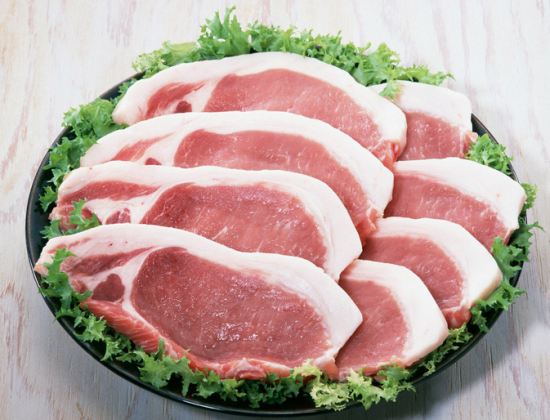Anna Dilger
 Pork is often viewed
as a “middle-of-the-road” option. It is typically less expensive than beef, but
more expensive than chicken. While beef cuts, especially steaks, are viewed as
luxury items or high-end dining experiences, pork is more of a staple food
featured as a variety of fresh and processed products at breakfast, lunch, and
dinner. To increase demand for pork and capture more of the high-end market,
improving fresh pork loin quality has been a focus
of the industry for many years. There is evidence that these efforts have been
successful. Compared with pork of the past, fresh pork loins have increased pH
and darker color. Additionally, the incidence of tough
pork has been reduced and overall pork tenderness improved. However, per
capita consumption of pork by the consumers of the United States has not
changed. This suggests that consumer acceptance and demand for fresh pork may
not depend on intrinsic characteristics such as pH, color, and tenderness. Extrinsic
factors like endpoint cooking temperature may have a larger influence on
consumer acceptability of fresh pork loin chops. It is possible that, in terms
of pork quality, we have been successful in eliminating the problems of the
pork industry like pale, soft and exudative pork, but this is not sufficient to
reach a consistently excellent eating experience in pork loins.
Pork is often viewed
as a “middle-of-the-road” option. It is typically less expensive than beef, but
more expensive than chicken. While beef cuts, especially steaks, are viewed as
luxury items or high-end dining experiences, pork is more of a staple food
featured as a variety of fresh and processed products at breakfast, lunch, and
dinner. To increase demand for pork and capture more of the high-end market,
improving fresh pork loin quality has been a focus
of the industry for many years. There is evidence that these efforts have been
successful. Compared with pork of the past, fresh pork loins have increased pH
and darker color. Additionally, the incidence of tough
pork has been reduced and overall pork tenderness improved. However, per
capita consumption of pork by the consumers of the United States has not
changed. This suggests that consumer acceptance and demand for fresh pork may
not depend on intrinsic characteristics such as pH, color, and tenderness. Extrinsic
factors like endpoint cooking temperature may have a larger influence on
consumer acceptability of fresh pork loin chops. It is possible that, in terms
of pork quality, we have been successful in eliminating the problems of the
pork industry like pale, soft and exudative pork, but this is not sufficient to
reach a consistently excellent eating experience in pork loins.
JAS, Volume 101, Issue Supplement_3
https://doi.org/10.1093/jas/skad281.216
Registration hotline: 021-57634675
fax: 021-57632800
Copy right : 上海亘泰实业集团
Collaboration & Sponsorship: 021-57634938 57631012
ASASHotline:021-67868428
Site Map | CNZZStatistics
address:Shanghai songjiang jiuting town nine new highway 90 lane 3 nine new commercial building 15 floor

WeChat ID:asaschina
The pig nutrition international BBS CSIS